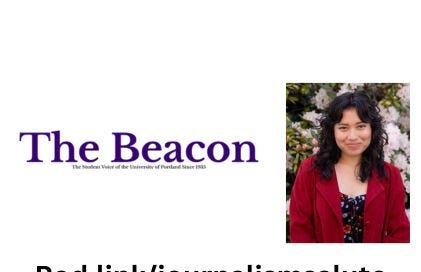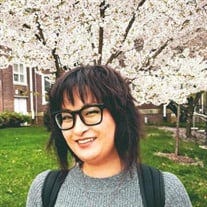One Last "Asaka's Take"
A tribute to our intern and her review of our interview with student journalist Kimberly Cortez
Hi everyone. I have some very sad news to share. TCNJ student journalist Asaka Park, who has been helping write these newsletters the last seven months, died on September 29 of a complication from Vascular Ehlers-Danlos, a rare genetic condition. She was 23.
Those of you who read her articles know that Asaka had a distinct journalism voice. She LOVED to write. She was passionate and courageous and a strong supporter for college students and for people with disabilities. She approached her writing for my newsletter with a high degree of enthusiasm and a strong desire to improve as a writer. I am saddened by her loss but grateful for having had the opportunity to know her and be touched by her writing.
At her celebration of life on Wednesday, I told her father that I had one more “Asaka’s Take” that I hadn’t published yet, coincidentally recapping an interview I did with a college student journalist. Her father said I could publish it, so I have. It’s a little shorter than some of her other pieces because we had recently discussed writing in a new format and doing personal essays separate, but I think you’ll recognize her voice in it.
I strongly encourage you to read some of her other articles (this one on the word ‘community’ and what it means to journalists is a favorite, as is this one on what journalism is meant to do) and on her personal blog, where she was writing a memoir.
In this episode, Mark Simon talks to Kimberly Cortez (she/they), a student journalist based in Portland, Ore. Kimberly is an editor-in-chief of The Beacon, the school paper for the University of Portland, where she majors in social work and minors in Spanish. She is also a New York Times Corps member and an intern for Street Roots, Portland’s award-winning weekly street newspaper.
Is there anything in your family or heritage that would foreshadow doing work in journalism or storytelling or anything like that?
At home, my parents would talk about their stories of growing up in a completely different country and they're often traumatic stories of leaving at such a young age … I just had so much empathy for other people that had different experiences … My parents always would tell [stories] and it wouldn't even just be serious stories, either; just like gossiping and talking about people from their home countries.
“I just never thought that this path would be viable for somebody like me somebody who's a 1st-generation college student, someone that primarily low income.”
Asaka’s take:
In an interview Mark did earlier this summer, another student journalist, Mary Rasura, also brings up chisme, a Spanish word roughly translated to “gossip.” While many of us might associate gossiping with spreading rumors about others, Mean-Girls-style, gossiping in these contexts really means exchanging information through “word-of-mouth” versus direct observation (if you ever heard people say that gossiping is an important tool for marginalized communities, they’re probably referring to that kind of gossiping). And all of this, of course, is a perfect opportunity for a journalist to step in and report the news.
Can you just give us a sense of your path to becoming the editor-in-chief and the experiences that you've had at your college paper?
I saw there was an opening at The Beacon and so I applied on a whim and that first year I was so dedicated to it, like almost a little bit too much.
…
I tried to apply to internships. I got rejected by all of them. And so then the summer before going into my junior year, I was just feeling so defeated, like, I don't think that this is going to happen for me. [My advisor] had sent me the website about the New York Times Corps program and I was like, I have nothing to lose at this point. And I got in…I really got serious about my reporting from that point on.
Asaka’s take:
What I found interesting is that there is a communication program but no dedicated journalism program at the University of Portland. Cortez says that The Beacon attracts driven students who are very motivated to report hands-on. For example, her student advisor, Nancy Copic, has over 15 years of professional experience in journalism. Overall, it sounds like a very authentic environment.
For the Times Corps program, you were paired with Mike Baker, who's a two time Pulitzer winner. What has that been like and what was it like to cover a pro Palestinian protest at your neighboring school, Portland State (for The Times)?
The program is set up so you have your mentor and you also have development sessions on different topics… [Last May] I got a call from Mike being like, “Hey we heard that there might be something going down at PSU. Would you be interested in covering it maybe? And I was like, “Yes!”
…
It was the first time that I had gone up to people and I was like, “Hi, I'm reporting on this issue and I'm with the New York Times. Can I interview you?,” and the amount of responses being like, “You work for the New York Times!?” … Having that response was sort of a wake up call of Okay, this is how it is like to do this at a national level.
And then, of course, actually being there experiencing some of the violence. There's the violence towards protesters, but there's also the violence towards journalists. I have been sprayed by the police with tear gas.
I had never felt what it's like to be in harm because of the work that I'm trying to do. So it was definitely a learning experience, both positive and negative. But it was ultimately helpful in understanding what kind of work I wanted to do, what it requires to report on a national level.
I've heard a lot about FOIA and dealing with government agencies and the challenges of that. What was it like to do that kind of reporting and write for that audience?
I had never filed a public records request [or] talked to city officials. All of those things were extremely new to me … I don't even know where to start, but I did have one goal and that was to do some sort of investigative piece because I knew that Street Roots was known for doing investigative work.
“I was on the Internet at such a young age. I loved digesting YouTube videos that had an investigative edge or talked about topics that were completely foreign to me.”
You're a social work major, what are your career aspirations?
A piece of advice I got recently is, if there's any other job that you want to do besides journalism, go and do it. And if there's not, then that's how you know that you want to do this.
And in this moment in time, that has never been more true for me.
Asaka’s take:
I’m very happy to hear this, and as a senior in my last semester, I can’t wait to experience that clarity soon.
My dream was to do personal essays and cultural commentary mixed in with general lifestyle advice—basically the stuff you’d see on Vice or Dazed, but untreated mental health problems derailed my aspirations, and I coped by writing about my challenges in a rather clinical way.
Now that I’m in a much better place, I’ve been poring over my resume, split between achievements in creative nonfiction and accessibility advocacy, and trying to find a workflow that would keep me in a good place long after I leave the structured environment of college. In the coming months, I hope to gain a better understanding of what this might look like.
Thank you, Asaka. We salute you for your good work. RIP






